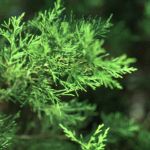| Common Name: |
Red Juniper |
| Other Names: |
Ashe Juniper, Cedar, Red Cedar, Texas Cedarwood |
| Botanical Name: |
Juniperus virginiana |
| Genus: |
Juniperus |
| Family: |
Cupressaceae |
| Location: |
North America |
| Direction: |
South |
| Magical Purpose: |
Balefire |
| Parts Used: |
Oil distilled from the wood of the tree. |
| Medicinal Uses: |
To treat baldness, rheumatism, skin rash, and cough. |
| Possible Side Effects: |
Cedarwood oil's side effects include allergic reactions. |
| Drug Interactions: |
| Taking cedarwood oil with these drugs may reduce the effectiveness of the drug: |
| Amobarbital, (Amytal) |
Amobarbital and Secobarbital, (Tuinal) |
Butabarbital, (Butisol Sodium) |
Butalbital, Acetaminophen, and Caffeine, (Esgic, Fioricet) |
| Mephobarbital, (Mebaral) |
Methohexital, (Brevital, Brevital Sodium) |
Pentobarbital, (Nembutal) |
Phenobarbital, (Luminol, PMS-Phenobarbital) |
| Primidone, (Apo-Primidone, Mysoline) |
Secobarbital, (Seconal) |
Thiopental, (Pentothal) |
|
| Supplement Interactions: |
Increased risk of toxicity when taken with herbs containing thujone, such as Oak Moss, Oriental Arborvitae, Sage, Tansy, Tree Moss, and Wormwood |
| Bibliography: |
The Essential Herb-Drug-Vitamin Interaction Guide by Geo. T. Grossberg,MD and Barry Fox,PhD Copyright ©2007 Barry Fox,PhD. Pp.138-139 |

